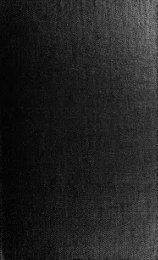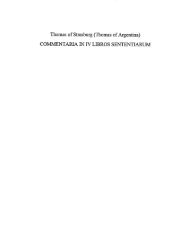- Page 1 and 2: B 1 1 I It I If I I ( c [ i [
- Page 3: fei'i^? H I I *ff?l *M-' Jf I ''its
- Page 6 and 7: Contents of the Introduction. i. Co
- Page 8 and 9: IV INTRODUCTION. I. I may now brief
- Page 10 and 11: VJ INTRODUCTION. gratefullv acknowl
- Page 14 and 15: X INTRODUCTION. himself with much s
- Page 16 and 17: XII INTRODUCTION. the Friars exaspe
- Page 18 and 19: XIV INTRODUCTION. to XV) is a more
- Page 20 and 21: XVI INTRODUCTION. the Scholastic th
- Page 22 and 23: XVIII INTRODUCTION. Ambrose, Jerome
- Page 24 and 25: XX can be predicated. INTRODUCTION.
- Page 26 and 27: XXII INTRODUCTION. remains in the c
- Page 28 and 29: XXIV INTRODUCTION. relative to the
- Page 30 and 31: XXVI INTRODUCTION. Antichrist and h
- Page 32 and 33: XXVIII INTRODUCTION. Ch. VIII. It i
- Page 34 and 35: XXX INTRODUCTION. identified with t
- Page 36 and 37: XXXII INTRODUCTION. never mention t
- Page 38 and 39: XXXIV INTRODUCTION. substantially,
- Page 40 and 41: XXXVI INTRODUCTION. of expounding i
- Page 42 and 43: 2 JOHANNIS WYCI.IF CAP. I. To know
- Page 44 and 45: 4 JOHANNIS WYCLIF CAP. I. in aposta
- Page 46 and 47: 6 JOHANNIS WYCLIF CAP. I. Neither t
- Page 48 and 49: 8 JOHANNIS WYCLIF CAP. I. it would
- Page 50 and 51: io JOHANNIS WYCLIF CAP. 1. non, ex
- Page 52 and 53: 12 JOHANNIS WYCLIF CAP. I. apostles
- Page 54 and 55: 14 JOHANNIS WYCI.IF CAP. 1. And the
- Page 56 and 57: 1 6 JOHANNIS WYCLIF CAP. I. .......
- Page 58 and 59: 1 8 JOHANNIS WYCLIF CAP. r. Et pate
- Page 60 and 61: 20 JOHANNIS WYCLIF CAP. II. 2 nd Co
- Page 62 and 63:
22 JOHANNIS WYCLIF CAr. u. How much
- Page 64 and 65:
24 JOHANNIS WYCLIE CAP. 11. favor i
- Page 66 and 67:
26 JOHANNIS WYCLIF CAP. II. I. Cor.
- Page 68 and 69:
28 JOHANNIS WYCLIF CAP - "' Especia
- Page 70 and 71:
3o JOHANNIS WYCI.IF CAP II. Should
- Page 72 and 73:
32 JOHANNIS WYCLIF [CAP. II. Its se
- Page 74 and 75:
34 JOHANNIS WYCLIF CAP. II. Nee obe
- Page 76 and 77:
36 JOHANNIS WYCUF CAP. [I. Second S
- Page 78 and 79:
38 JOHANNIS WYCLIF CAP. [I. These '
- Page 80 and 81:
40 JOHANNIS WYCI.IF CAP. II. a sect
- Page 82 and 83:
42 IOHANNIS WYCLIF CAP. II. hcviis
- Page 84 and 85:
44 FOHANNIS WYCLIF CAf '- 1L Sergii
- Page 86 and 87:
CAPITULUM TERTIUM. We have now Quia
- Page 88 and 89:
48 JOHANNIS WYCLIF CAP. ill The wor
- Page 90 and 91:
5o JOHANNIS WYCLIF CAP. III. If the
- Page 92 and 93:
52 .IOHANNIS WYCLIF CAP. III. '•T
- Page 94 and 95:
54 CAP. III. .IOHANNIS WYCLIF DE AP
- Page 96 and 97:
56 CAP. IV. .IOHANNIS WYCLIF The sa
- Page 98 and 99:
58 JOHANNIS WYCLIF CAP. IV. habito
- Page 100 and 101:
6o .IOHANNIS WYCLIF CAP. IV. huius
- Page 102 and 103:
CAPITULUM QUINTUM. Objections Sed c
- Page 104 and 105:
64 JOHANNIS WYCLIF CAP. V. W1 refer
- Page 106 and 107:
66 JOHANNIS WYCI.IF CAP. V. autem p
- Page 108 and 109:
68 JOHANNIS WYCLIF CAP. V. informac
- Page 110 and 111:
70 JOHANNIS WYCLIF DE APOSTASIA. CA
- Page 112 and 113:
72 JOHANNIS WYCLTF CAP. VI. Christi
- Page 114 and 115:
74 JOHANNIS WYCLIF CAP. VI. eterni
- Page 116 and 117:
( - 7 JOHANNIS WYCLIF CAP. VI. It i
- Page 118 and 119:
78 JOHANNIS WYCLIF CAP. VI. precipu
- Page 120 and 121:
So JOHANNIS WYCLIF CAP. VI autentic
- Page 122 and 123:
CAPITULUM SEPTUM. Some say: Sed ult
- Page 124 and 125:
84 JOHANNIS WYCLIF CAP. VII. but ra
- Page 126 and 127:
86 JOHANNIS WYCLIF CAP. VII. faller
- Page 128 and 129:
88 JOHANNIS WYCLIF [CAP. VII. The s
- Page 130 and 131:
90 .JOIIANNIS WYCLIF CAP. VII. tali
- Page 132 and 133:
CAPITULUM OCTAVUM. De multiplicacio
- Page 134 and 135:
94 JOHANNIS WYCLIF CAP. VIII. The S
- Page 136 and 137:
96 JOHANNIS WYCLIF CAP. VIII. Sic,
- Page 138 and 139:
98 JOHANNIS WYCLIF CAP. Vm. ifasubd
- Page 140 and 141:
I oo JOHANNIS WYCLIF CAP- VET For a
- Page 142 and 143:
102 JOHANNIS WYCUF DE APOSTASIA. CA
- Page 144 and 145:
104 IOHANNIS WVCF.IF CAP. IX. et |
- Page 146 and 147:
io6 JOHANNIS WYCLIF CAP. IX. altari
- Page 148 and 149:
io8 JOHANNIS WYCLIF CAP. TX. should
- Page 150 and 151:
I I o JOHANNIS WYCLIF CAP. IX. Et s
- Page 152 and 153:
H2 CAP. IX. JOHANNIS WYCT.IF August
- Page 154 and 155:
H4 JOHANNIS WYCLIF CAP. IX. fuerunt
- Page 156 and 157:
i [
- Page 158 and 159:
lis JOHANNIS WYCLIF DE APOSTASIA. C
- Page 160 and 161:
I 20 JOHANN1S WYCLIF CAP. X. see wh
- Page 162 and 163:
122 .IOHANNIS WYCLIF CAP. X. then G
- Page 164 and 165:
124 JOHANNIS WYGLIF CAP. X. This is
- Page 166 and 167:
126 IOHANNIS WYCLIF CAP. X. And all
- Page 168 and 169:
128 JOHANNIS WYCLIF CAP. X. id est,
- Page 170 and 171:
i3o JOHANNIS WYCMF CAP. X. The Spou
- Page 172 and 173:
Can an accident Restat videre direc
- Page 174 and 175:
1 34 JOHANNIS WYCLIF CAP. XI. Then
- Page 176 and 177:
I 36 JOHANNIS WYCLIF CAP. XI. poste
- Page 178 and 179:
1 38 JOHANNIS WYCLIF CAP. XI. hut n
- Page 180 and 181:
140 JOHANNIS WYCLIF CAP. XI. verita
- Page 182 and 183:
142 JOHANNIS WYCLIF CAP. XI. bilior
- Page 184 and 185:
144 JOHANNIS WYCLIF CAP. XI. IV. Tw
- Page 186 and 187:
146 JOHANNIS WYCI.IF CAP. XI. iste
- Page 188 and 189:
14S JOHANNIS WYCLIF CAP. XI. nimis
- Page 190 and 191:
i5o JOHANNIS WYCLIF CAP. XI. libet
- Page 192 and 193:
1 52 JOHANNIS WYCLIF CAP. XII. Qual
- Page 194 and 195:
1 54 JOHANNIS WYCLIF CAP. XII. agen
- Page 196 and 197:
1 56 JOHANNIS WYCLIF CAP. XII. Sign
- Page 198 and 199:
I 58 IOHANNIS WYCI.IF CAP. XII. et
- Page 200 and 201:
iGo JOHANNIS WYGLIF CAP XII. liven
- Page 202 and 203:
1 62 JOHANNIS WYCLIF CAP. XII. ment
- Page 204 and 205:
1 64 JOHANNIS WYCLIF CAP. XII . God
- Page 206 and 207:
iG6 JOHANNIS WYCLIF CAP. XIII. serm
- Page 208 and 209:
1 68 JOHANNIS WYCL1F CAP. XIII. St.
- Page 210 and 211:
i 70 JOHANNIS WYCLIF CAP. XIII. nia
- Page 212 and 213:
172 JOHANNIS WYCLIF CAP. XIII. Supp
- Page 214 and 215:
174 JOHANNIS WYCLIF CAP. XIII. 3* d
- Page 216 and 217:
176 IOHANNIS WYCI.IF CAP. XIII. pud
- Page 218 and 219:
178 JOHANNIS WYCLIF CAP. XIII. loca
- Page 220 and 221:
CAPITULUM QUATUORDECIMUM. In presen
- Page 222 and 223:
K MIANNIS WY'CLIF ' tf*- XIV. it se
- Page 224 and 225:
I JOHANNIS WYCLIF CAP. Xiv. ,i (lod
- Page 226 and 227:
JOHANNIS WYCLIF CAP. XIV. Nee oport
- Page 228 and 229:
1 88 JOHANNIS WYCLIF CAP. XIV. popu
- Page 230 and 231:
i go JOHANNIS WYCLIF CAP. XIV. igit
- Page 232 and 233:
102 .lOHANNIS WYCLIF DK APOSTASIA.
- Page 234 and 235:
k
- Page 236 and 237:
iq6 JOHANNIS WYCLIF CAP. XV. Sed pr
- Page 238 and 239:
i g3 JOHANNIS WYCLIF CAP. XV. II th
- Page 240 and 241:
200 JOHANNIS WYCLIF CAP. XV. necess
- Page 242 and 243:
202 JOHANNIS WYCI.IF CAP. XV. gulos
- Page 244 and 245:
204 JOHANNIS WYCLIF CAP. XV. They m
- Page 246 and 247:
206 .IOHANNIS WYCLIF CAP. XV. objec
- Page 248 and 249:
208 JOHANNIS WYGI.IF CAP. XVI. nis
- Page 250 and 251:
2 i o JOHANNIS WYCI.IF CAP. XVI. no
- Page 252 and 253:
2 12 JOHANNIS WYCLIF CAP. XVI. it w
- Page 254 and 255:
214 JOHANNIS WYCI.IF CAP. XVI. I ch
- Page 256 and 257:
2i6 JOHANNIS WYCLIF CAP. XVI. adver
- Page 258 and 259:
2l8 JOHANNIS WYCI.IF CAP. XVI. sed
- Page 260 and 261:
2 20 JOHANNIS WYCLIF CAP. XVI. The
- Page 262 and 263:
222 JOHANNIS WYCLIF CAP. XVI. dicit
- Page 264 and 265:
224 JOHANNIS WYCLIF CAP XVI. sectar
- Page 266 and 267:
22fi lOIIANNIS WYCLIF CAP. XVI. qua
- Page 268 and 269:
228 JOHANNIS WYCLIF GAP. XVI. novum
- Page 270 and 271:
23o JOHANNIS WYCLIF CAP. XVI. facia
- Page 272 and 273:
232 JOHANNIS WYCLIF CAP. XVI. mandu
- Page 274 and 275:
CAPITULUM SEPTEMDECIMUM. The Sacram
- Page 276 and 277:
236 JOHANN1S WYCLIF CAP. XVII. St.
- Page 278 and 279:
238 JOHANNIS WYCLIF CAP. XVII. tuci
- Page 280 and 281:
240 JOHANNIS WYCLIF CAP. XVII. But
- Page 282 and 283:
242 JOHANNIS WYCLIF CAP. XVII. Thei
- Page 284 and 285:
244 .JOHANNIS WYCLIF CAP. XVII. cum
- Page 286 and 287:
246 JOHANN1S WYCI.IF CAP. XVII. pat
- Page 288 and 289:
24* JOHANNIS WYCLIF CAP. XVII. . Re
- Page 290 and 291:
25o JOHANNIS WVCLIF CAP. XVII. Thes
- Page 292 and 293:
252 IOHANNIS WYCLIF CAP. XVII. iden
- Page 294 and 295:
2 54 JOHANNIS WYCLIF DE APOSTASIA.
- Page 296 and 297:
256 INDEX. Augustine, St., Father o
- Page 298 and 299:
258 INDEX. here too much magnified,
- Page 300:
Vindobonae, Carolus Fromme, typogr.
- Page 303 and 304:
1 BR 75 . W8 9 WELLESLEY COLLEGE LI

















